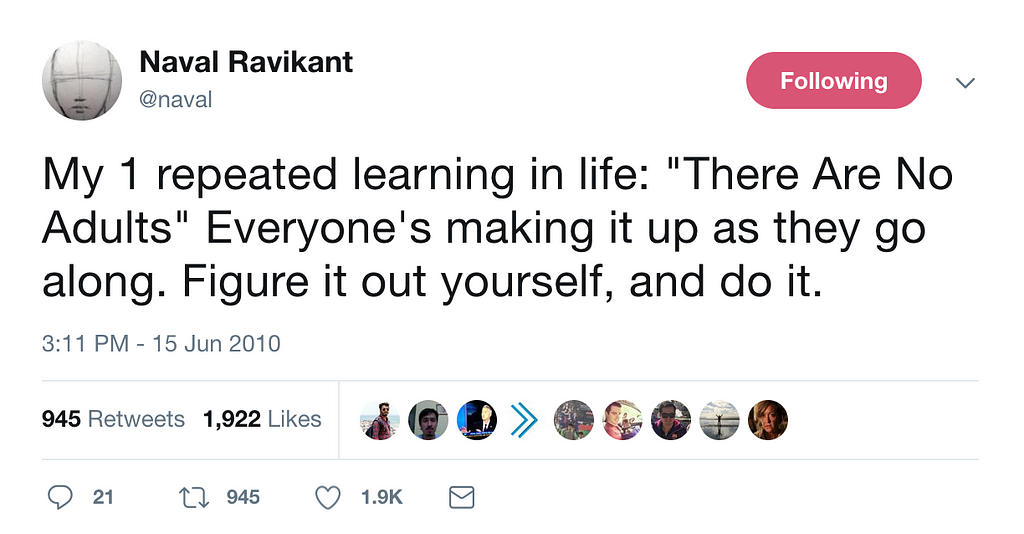Serafin Lion Engel: “Hunt like a lion; Lions take active rest periods that enable them to rapidly exert their energy reserves in the moments when an opportunity presents itself.”

Hunt like a lion. It is easy to fall into the trap of spending every waking hour working on your company. The problem inherent in this strategy is that your baseline level of involvement in the details is so great that you lose sight of the bigger picture and are not vigilant about opportunity. One of the worst things that can happen to you is that you simply start building without reflection and you end up way astray of where you ultimately wanted to go, deprived of the resources required to reroute. A valuable trait to emulate is the hunting behavior of lions. These animals are the epitome of lassitude during most of the day. However, they still manage to hunt prey that is multiple times faster than them. The key to achieving this lies in their overt laziness through most of the day. Lions take active rest periods that enable them to access and rapidly exert their energy reserves in the moments when an opportunity to hunt presents itself. It is precisely this skill, which is often times vastly undervalued in our society which encourages us to deprive our energy reserves every single day. Save your energy, be highly attentive of your environment, and rapidly pounce on big opportunities when they present themselves.
I had the pleasure to interview Serafin Lion Engel. Serafin is Founder and CEO of DataWallet, a decentralized consumer-to-business data exchange provides internet users with a self-sovereign wallet that puts them in charge of their data, and allows them to monetize as well as utilize an asset that is rightfully theirs. He is a fellow at the Royal Society for the encouragement of Arts, Manufactures and Commerce (The RSA) in London and was a Petra Vorsteher Scholar at Draper University.
Yitzi: Thank you so much for doing this with us! What is your “backstory”?
I was born and raised in Germany. I started my first company at age 17, which allowed students to get the help of an A+ student for their homework. I started my first real company in college at age 20, which was a mix of Facebook messenger’s audio messaging function and Dubsmash. At that time, I had absolutely no network in the startup ecosystem. In fact, I didn’t have one single person in my network who was associated with the startup community, let alone had started a company him/herself.
Shortly after, I received a scholarship to attend Draper University, an entrepreneurship school founded by legendary VC Tim Draper, who was an early investor in companies such as Skype, Hotmail, Baidu, Tesla, and SpaceX. It was a transformative experience since this was the first time I got in contact with the mindset that sets Silicon Valley apart from all other places in the world. You received points for trying bold things, no matter how slim the chances of success. The two options you faced as a result of that were extreme success or outrageous failure. However, for the score you received, the outcome was irrelevant: you got the same amount of points for outright failure that you received for tremendous success. What Draper U wanted to instill in you is that failing is an inevitable process of growth and progress; something to be embraced, not avoided.t Once I internalized that, I was off to the races with DataWallet, which was an idea I had several days before departing to Draper U.
I ended up winning the pitch competition at Draper University, and decided to stay in the Valley for another 4 weeks before heading back to Germany. In that time, and solely equipped with a pitch deck and a bold vision, I raised $150K from Tim Draper and another $150K from Salesforce founder Marc Benioff. Since that day, I have enjoyed the incredible fortune to work together with some of the most brilliant minds that I have ever come across, such as my co-founder Dan Hawthorne, and build out a complete end-to-end decentralized data exchange that empowers users to take control of one of the most valuable assets that they own — -their data. Delightfully, putting users in charge enables developers to build the most powerful personal user focused machine learning algorithms, and gives companies unprecedented insights.
Yitzi: Can you share the funniest or most interesting story that happened to you since you started your company
The most interesting story took place at the inception of DataWallet, when two of the most well-known billionaires in tech took a chance on a then 23 year old from Germany, with no proven track record in the startup ecosystem, no team, no product, and came equipped solely with a well-researched pitch deck.

Yitzi: So how exactly does your company help people?
Datawallet is a decentralized consumer to business (C2B) data exchange that is disrupting the $300 billion data brokerage market by harnessing the Blockchain to empower users to control and profit from their data. Datawallet provides users with a self-sovereign wallet that puts them in charge of their data. It allows them to monetize as well as utilize an asset that is rightfully theirs. It also empowers developers to leverage a new data universe to build the next generation of personalized applications, and to provide companies with insights that will boost their operations on an unprecedented scale.
In practical terms, this means that we provide users with a digital wallet that belongs to them and them only. Upon registering on DataWallet, personal users can link multiple data sources to this digital wallet; from social media to online commerce and offline transactions. Users can then opt-in to share this data with companies in return for either cash or improved services. You could, for instance, link your data to a video platform and improve the recommendations you get for which movie to watch tonight, which is not simply derived from generic information about which films you watched last on their platform, but which is based upon your unique character nuances. Or you can share it with e-commerce platforms and get discounts on products that are perfectly tailored to your various interests rather than what you previously bought on that particular website. Your Datawallet will be your passport to the next generation of the internet in which every digital service and product is personalized.
Yitzi: How have you used your success to bring goodness to the world?
Our platform gives people ownership of an asset that is rightfully theirs. It may not be talked about publicly a lot, but data brokerage is in fact one of the most pressing socio-economic of our times.
A special one year investigation into the Data Brokerage market — led by Senator Jay Rockefeller IV and the Senate Committee on Commerce, Science, and Transportation — estimated the total market market size of Data Brokerage to be $156 billion in 2012. This means that the average American citizen would have made roughly $1,600 that year. That is a 2.8% increase to the median household income. Due to their relatively higher internet
consumption, millennials between 18 and 29 would have made $2,600 per year if they were receiving the proceeds of Data Brokerage. These proceeds will become even more substantial given the exponentially growth of this asset class. A staggering 90% of all data has been created in the past two years. If we do a simple forecast of the Data Brokerage market based on
a weighted growth factor collated from research presented by EMC and the growth rates of publicly listed data brokers (Acxiom, Equifax, Experian, and Alliance Data Systems), we find that this market stands to grow about 27% per year. In the year 2022, the potential proceeds of an individual’s data will have grown to an average of $6,700 per American internet user per year, with millennials standing to make around $10,900 per person. This is an average increase to median household income of 9.1% and our platform paves the way for this capital inflow to be redirected to the people who create this data.
Yitzi: What are your “5 things I wish someone told me Before I Launched My Start-Up” and why. (Please share a story or example for each.)
- “If you need a pep talk, don’t do it”
That’s what Elon Musk told a previous class of Draper University, and I couldn’t agree more. Going into entrepreneurship, you need to be willing to give everything you’ve got, every single day. You need to put it all on the line, while being absolutely aware and at peace with the fact that you may come just that one tiny inch short that stands between failure and incredible success. You need to be a mental acrobat and on a daily basis achieve the almost impossible feat of being the strongest believer in your mission and vision, but at the same time being your biggest critic. Your internal drive, your hunger, and your dedication need to be so strong that you maintain in this mode for years without faltering once. Because the ground truth in entrepreneurship is that if you don’t do it, nobody will.
- There are no adults — people just make it up as they go
A tweet from Naval Ravikant, the founder of Angellist, from 2010 reads:

When you’re in high school or college, the rules are clear. When you take a test, your answers are either right or wrong. It may not always be fair, but it’s always simple, and always black and white. When you enter the world of entrepreneurship, however, most of what you encounter is a shade of grey. The notion that there is a pre-defined playing field, where you succeed by simply learning and abiding by the rules of engagement, is mostly a myth. That is especially the case if you start a company. While there are some principles that are universal, they are mostly theoretical and are of little practical help in figuring out the details of the situation you are immediately faced with. This may discourage you, because it implies that there is no easy way out. You cannot simply ask an “expert” who can give you an objectively correct answer. And you will find that there are no easy solutions for complex problems. However, it should also encourage you, because it also means that there are thousands of ways to solve your problem. The world is full of opportunities that are simply waiting for you to discover. And you have the same claim to these opportunities as anyone else. Because in entrepreneurship, everybody who is called an “expert” turns out to simply have a fancy title.
- Don’t rush it — good things take time
Trust the process. Don’t expect immediate gratification for doing great deeds. Be patient and maintain your composure. Know that hard work pays off: maybe not right at the time that is best for you, but at a time that is right for what you’re doing.
- Beware of the Purkinje effect:
If you are building something which is truly transformational, chances are that the customer need you are trying to solve does not yet exist, at least not at scale. This means that there is no market for what you are selling. A good picture to keep in mind is that of the Purkinje effect, according to which colors that are the brightest at daylight look the darkest at night. While you are in development of your product and during which your market does not yet exist, you will endure a long and cold nighttime in which the prospects of your idea may look very dark. Prepare to look like a fool. But be mindful and take comfort in the fact that extreme darkness by night is a quintessential property of every idea that shines the brightest at day.
- Hunt like a lion
It is easy to fall into the trap of spending every waking hour working on your company. The problem inherent in this strategy is that your baseline level of involvement in the details is so great that you lose sight of the bigger picture and are not vigilant about opportunity. One of the worst things that can happen to you is that you simply start building without reflection and you end up way astray of where you ultimately wanted to go, deprived of the resources required to reroute. A valuable trait to emulate is the hunting behavior of lions. These animals are the epitome of lassitude during most of the day. However, they still manage to hunt prey that is multiple times faster than them. The key to achieving this lies in their overt laziness through most of the day. Lions take active rest periods that enable them to access and rapidly exert their energy reserves in the moments when an opportunity to hunt presents itself. It is precisely this skill, which is often times vastly undervalued in our society which encourages us to deprive our energy reserves every single day. Save your energy, be highly attentive of your environment, and rapidly pounce on big opportunities when they present themselves.
Serafin Lion Engel: “Hunt like a lion; Lions take active rest periods that enable them to rapidly… was originally published in Authority Magazine on Medium, where people are continuing the conversation by highlighting and responding to this story.
